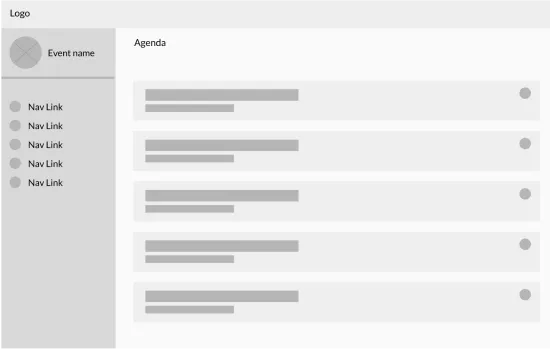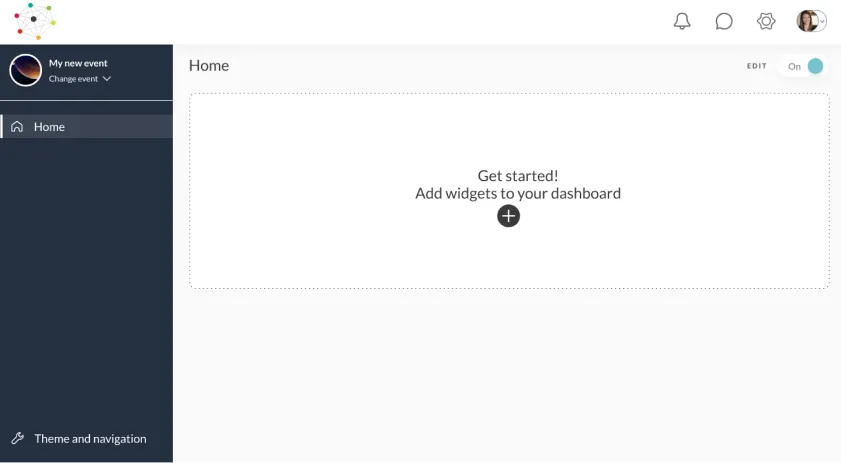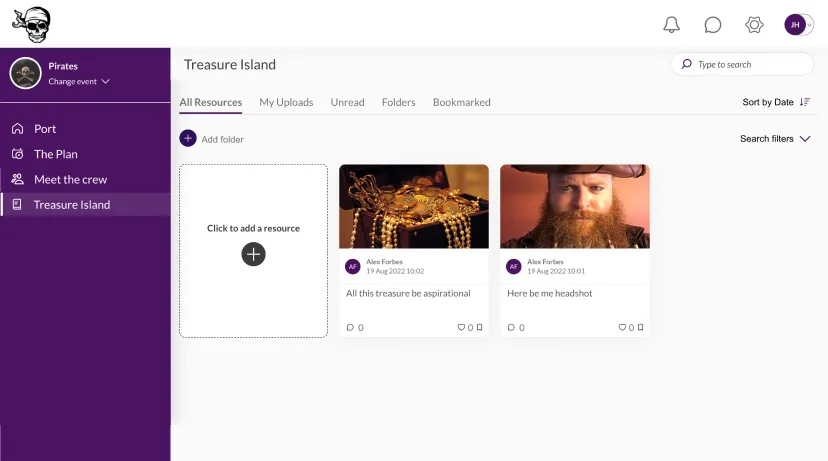Event web app.
A new product configuration and revenue stream








Key metrics
50%
Reduction in set up time
10%
Increase in annual licences
New
Clients and partners won
Project summary
As the Lead Product Designer and Project Manager, I redesigned a highly customised event platform into a modular, scalable product that could support diverse client needs while reducing setup time and cost. Through focused research, design system development, and collaborative iteration, we delivered a flexible event app that balanced brand personalisation with streamlined setup—laying the foundation for broader use across clients and event types.
Challenge.
An events company with a highly customisable web app wanted to create a new, scalable product. Their existing platform required significant time and investment for setup. The goal was to retain popular features while reducing build time and cost.
My role
Lead product designer, Project manager
Project duration
6 months
Leadership Highlight
Led both design and project governance—balancing user goals, stakeholder alignment, and delivery timelines across a fast-moving six-month project.
Solution.
To balance scalability with customisation, we created a repeatable online event solution featuring:
- Streamlined setup for cost efficiency
- Flexible environment with configurable widgets and pages
- Admin area for user management and reporting
- Brand-able elements to give each event it’s own visual identity
- Everything in one place for users - easy to navigate, clear, flexible sign posting
- Easily accessible resources, agendas and speaker bios
- Interactive features (surveys, polls, discussion boards)
- Integration with video conferencing (Zoom, Vimeo)
- Tools to engage participants beyond the event
Success Metrics
- Admins set up events in under a day
- Participants easily navigate and engage with event content
- Increased licenses and revenue
Key leadership moment
Recognising diverse user needs, I led workshops to prioritise features based on user impact and feasibility, balancing innovation with practical constraints. This prioritisation guided the roadmap and optimised resource allocation.

Research.
Stakeholder interviews
We aligned with stakeholders on business goals, including input from existing clients interested in the new product line.
Leadership Highlight
Designed the research plan to surface both functional gaps and hidden strengths in the legacy platform, informing a more focused MVP.
Feature prioritisation
I conducted a survey in which event producers would rank features based on how regularly they were set up and interacted with by users.


Focus group
Through group sessions and empathy mapping, we identified two main personas:




Persona 1: Event participant
Varying engagement levels from highly active to passive users. Often have busy schedules and differing levels of tech literacy.


Persona 2: Event producers
Need for fast setup and last minute changes. Every event is different and needs a toolkit of easily interchangeable features, navigation points and customisable branding.


Usability sessions with event producers
I observed event producers setting up events, noting their frustrations with complex admin panels. These observations informed our design priorities, emphasising simplicity and efficiency.
Session output
Feedback was documented, themed, and validated with producers and stakeholders.


Key challenges from the original product
- The main graphic interface requires too much design time and configuration
- Admin area had unclear labelling and no guidance
- Setting the theme and navigation was overwhelming and lacked visual feedback
Leadership Highlight
Transformed research insights into actionable design priorities—championing simplicity, speed, and clarity in a modular system.
Design.
We aimed for an intuitive, modular design that allowed flexible event experiences without heavy customisation. Developers were involved for discussion around the technical approach.
Example early phase design and feedback

Feedback: Navigation too narrow for easy editing and longer labels

Improved: Wide navigation (also makes navigation feel more primary)

Feedback: Full width hero does not allow full flexibility

Improved: All widgets same height to allow flexible positioning
Example flow for administration tasks such as setting up the navigation



Page layouts for configurable pages types



UI Design
Allowing for clients to build a unique event experience easily applying their branding and visuals.
Editable navigation and theme to allow a bespoke event experience


Configurable widgets and homepage to focus content and messaging





Additional configurable pages types with easily managed content




Dynamic agenda to facilitate the live session and remote control participant interactions



Administration area for managing users and other back-end settings


Design system
The original product had many outdated patterns and components. I led the development of a scalable new design system, balancing modern aesthetics with the need for consistency. This included a flexible colour system to support event branding while maintaining a cohesive experience.

Leadership Highlight
Defined a new design system from scratch, balancing flexible branding needs with scalable, cohesive components—and enabling future reuse across events.
Project governance
Weekly documentation tracked project timelines, design decisions, and stakeholder alignment.




Key leadership moment
In the original product inconsistencies in UI components slowed down development, I spearheaded the creation and adoption of a scalable design system. Partnering closely with engineers, I ensured design tokens were developer-friendly, which accelerated delivery and improved interface consistency.

Testing.
Challenges when testing
The product’s flexible, modular nature required tailored testing scenarios. I created prototypes for both event producers and stakeholders.
Observed testing with event producers
I conducted task-based tests with event producers, gaining honest feedback—especially from users new of the tool. Their confusion around certain features highlighted areas needing clearer guidance. Feedback informed design iterations.
Leadership Highlight
Used testing insights to influence product guidance and onboarding strategy—ensuring clarity for first-time users and efficiency for returning producers.

Feedback: Lack of guidance and explanation of expected flow

Improved: Added visuals, micro copy, tool-tips and clearer calls to action

Feedback: Unclear that content is set up within pages, not widgets

Improved: Added guidance for configuring content for widgets

Feedback: Further information needed to explain purpose of widgets

Improved: Added visuals, microcopy and calls to action to guide
Prototypes
Example prototype before feedback
Example improved prototype
Prototype of participant experience
Development.
Mark-up
All interactions and components were documented for smooth handover to development.


Testing and QA
I collaborated closely with developers and QA testers throughout the sprints.
Launch & impact.
Pre-launch testing
An internal workshop, designed to be fun and engaging, doubled as a usability test. Teams competed to build themed events, offering real-time feedback and fostering internal excitement about the product.


Pilot events
The new app was piloted with a global pharmaceutical client, resulting in a 2x faster setup than the original product. Events were easily duplicated and adjusted for series consistency, enhancing both the producer and participant experiences.
Leadership Highlight
Delivered measurable impact with pilot clients—doubling setup speed and enabling scalable event delivery with consistent user experiences.
Key metrics
50%
Reduction in set up time
10%
Increase in annual licences
New
Clients and partners won
Key Contributions
- Led the design and delivery of a modular, scalable event platform
- Planned and executed research to prioritize real-world producer workflows
- Developed a brand-ready design system to support repeatable event experiences
- Translated usability feedback into product guidance improvements
- Delivered successful pilot outcomes with measurable speed and quality gains


